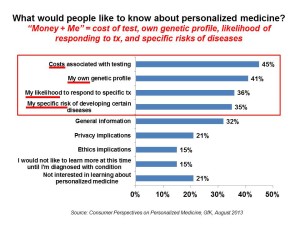 Only 1 in 4 U.S. adults over 30 know what “personalized medicine” (PM) really is, and only 8% of people feel very knowledgeable about the concept based on Consumer Perspectives on Personalized Medicine from GfK, published online in August 2013. GfK surveyed 602 online adults 30 years and over between February and March 2013 drawn from the company’s KnowledgePanel sample of U.S. adults.
Only 1 in 4 U.S. adults over 30 know what “personalized medicine” (PM) really is, and only 8% of people feel very knowledgeable about the concept based on Consumer Perspectives on Personalized Medicine from GfK, published online in August 2013. GfK surveyed 602 online adults 30 years and over between February and March 2013 drawn from the company’s KnowledgePanel sample of U.S. adults.
Only 4% of people who have heard of personalized medicine describe it accurately as “medicine based on genome/genetic make up.” About one-half of people (52%) defined PM as medical care, treatment, or medicine geared toward individual needs.
The poll also found that people with four or more medical conditions (32%) and people that have been diagnosed with life-threatening cancer (67%) are much more likely to be interested in genetic testing than the general population is. In fact, people seem to weigh risk vs. “clinical reward” given that they have less concern about side effects when evaluating proven treatments.
People interested in personalized medicine and genetic testing are most keen to know, first, the costs of genetic testing (45% of people), followed by “my own” genetic profile (41%), my likelihood of responding to a specific treatment (36%) and my specific risk of development certain diseases (35%). Lower down the list of “would like to knows” are privacy implications (21%) and ethics implications (15%). 21% of people aren’t interested in all in learning about PM, and 15% don’t want to know much until they’re diagnosed with a specific condition by a doctor.
Health Populi’s Hot Points: About 4 in 5 people appear to want to know more about personalized medicine, based on the GfK poll. They want to know about (1) costs and the money aspect of testing, and (2) they want to know about “Me:” my own profile, my risks and potentials for responding to specific treatments for specific conditions.
The follow up question was “how would you like to receive health-related information?” The mean number of sources people cite was 1.9 (say, 2). When asked if they’re interested in learning more about the topic of PM, first and foremost, it’s their doctor or nurse that people want to hear from – 65% of people like the doctor channel for receiving healthcare related information. Second, websites are valued for PM info among about one-half of people. Finally, and interestingly, paper-formats like mailings to my home (38%) and pamphlets at my doctor’s office (31%) are favored media for receiving health care related info. The paper-based communications may be valued by some consumers who are concerned about privacy online for this type of health care information which could be deemed more sensitive in nature.
There are signs in popular culture in 2013 that point to people being keen on getting to know their DNA, from Lisa Kudrow’s show Who Do You Think You Are?, now in its fourth year on TLC, to 23andme’s TV campaign for Portraits of Health, promoting their $99 Personal Genome service. GfK’s data indicate that people really do want to know more and get evermore closer to their DNA.




 Thank you FeedSpot for
Thank you FeedSpot for